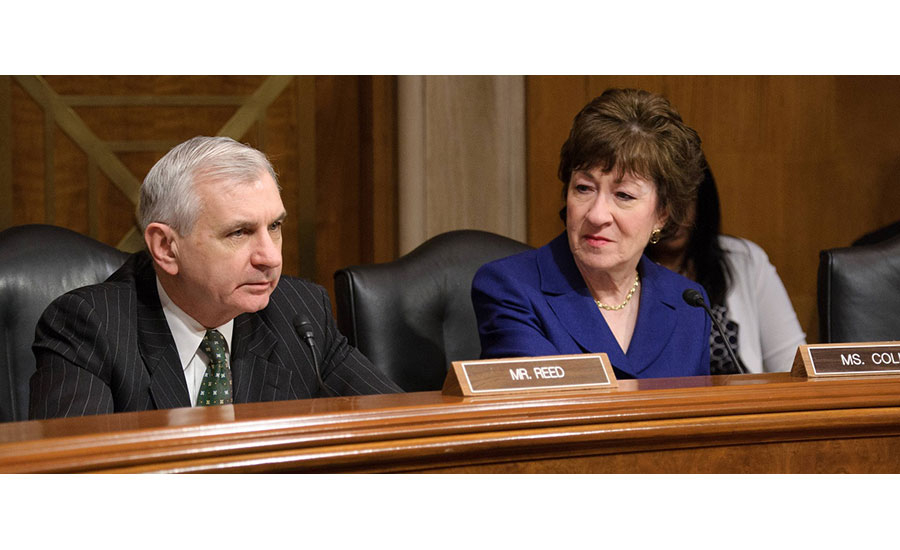As fiscal 2018 spending bills make their way through Congress, the numbers for key transportation construction programs are coming into clearer focus. Though spending levels are far from final, Senate and House appropriators have generally rejected the sharp cuts President Trump proposed for important infrastructure accounts.
Bills funding Transportation Dept. and Housing and Urban Development Dept. programs have cleared committee in each chamber, with the Senate panel's version, cleared on July 27, more generous to construction-related accounts than the bill the House Appropriations Committee approved 10 days earlier.
Senate appropriators, in unanimously clearing their 2018 DOT-HUD measure, spurned Trump's proposal to zero-out DOT's highly popular Transportation Investment Generating Economic Recovery (TIGER) grants and his plan to slash transit capital grants, which fund new project starts. [View Senate bill highlights here.]
Senate transportation-HUD subcommittee Chairman Susan Collins (R-Maine) said the bill "makes vital investments in our nation's infrastructure." Collins is one of the TIGER program's strongest defenders, and the bill would boost the program by $50 million, or 10%, to $550 million.
It also provides $2.1 billion for transit capital investment grants, down 12% from the enacted 2017 spending level but well above Trump's proposed $1.2 billion.
The House committee version agrees with Trump's zero funding for TIGER but provides $1.75 billion for transit capital grants. [View House bill summary here.]
For the biggest DOT construction line item, the federal-aid highway obligation limit, the Senate panel's measure provides $44.2 billion, up 2% from 2017's level. That amount is the same as the 2018 authorization set in the five-year Fixing America's Surface Transportation (FAST) Act, signed into law in 2015.
The House committee recommended the same highway obligation limit but also would rescind $800 million in unobligated highway authority from previous years.
Senate Panel Hikes Airport PFCs
Airport groups were big winners in the Senate committee's bill. Lawmakers included an increase in the federal cap on passenger facility charges (PFCs). If enacted, it would be the first hike in the fees since 2000. The measure would allow airports to charge travelers as much as $8.50 per outbound flight segment, up from the current $4.50.
PFCs are an important revenue source for airport infrastructure projects. PFC collections totaled $3.2 billion in calendar 2016, up 4% from the previous year, according to the Federal Aviation Administration.
The committee bill also would boost FAA's Airport Improvement Program (AIP) construction grants by $250 million, or 7%, to $3.6 billion. AIP has been holding at $3.35 billion a year since 2012.
The American Association of Airport Executives, unsurprisingly, was happy to see the Senate committee's action. AAAE CEO Todd Hauptli, who attended the voting session, said in a statement that the PFC and AIP recommendations "will go a long way toward closing down the infrastructure investment gap that airports have struggled with for well over a decade."
But major airlines continue to oppose the PFC hike. Their organization, Airlines for America, estimates that increasing PFCs to $8.50 would cost passengers $3.2 billion. Nicholas Calio, Airlines for America CEO, said in a statement, "Choosing to increase this tax is a completely unnecessary poke in the eye and wallet of air travelers."
The House committee's version doesn't include a PFC increase and freezes AIP at $3.35 billion for 2018. Trump's budget also called for $3.35 billion for that program.
Sen. Reed's $7.7-Billion Amendment Defeated
The Senate committee turned down a proposal to hike infrastructure programs even more. By a 16-15 party-line vote, the panel defeated an amendment proposed by Sen. Jack Reed (D-R.I.) that would have added $7.7 billion to the transportation-housing total.
Reed said overall infrastructure investment needs are "dire," and his proposal included $2 billion for bridges, $1 billion for TIGER and $1.5 billion for transit.
But Collins, who, like other Republicans on the panel, voted against Reed's amendment, said the bill already includes many provisions requested by senators from both parties. She and some other appropriators would like to see an increase in the caps on overall nondefense and defense spending, which would allow for more money for infrastructure accounts.
HUD CDBGs Avoid Big Cut
Among HUD programs, both committees turned down Trump's proposal to wipe out all funding for Community Development Block Grants, whose uses include infrastructure improvements. The Senate panel recommended $3 billion for the block grants, the same as the 2017 enacted level; the House committee provided $2.9 billion.
The next step for the Senate and House committee bills would be floor votes, though with Congress facing a Sept. 30 deadline to enact fiscal 2018 spending bills, another stopgap funding measure is a strong possibility.





Post a comment to this article
Report Abusive Comment